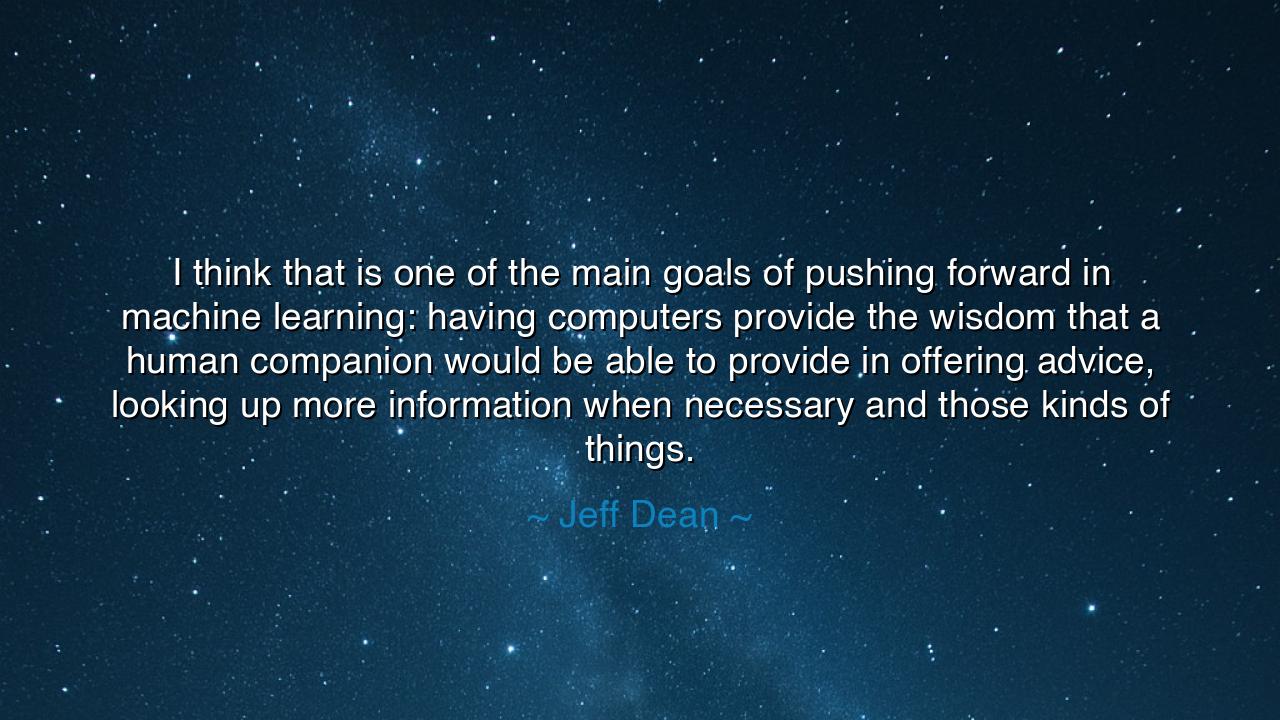
I think that is one of the main goals of pushing forward in
I think that is one of the main goals of pushing forward in machine learning: having computers provide the wisdom that a human companion would be able to provide in offering advice, looking up more information when necessary and those kinds of things.






The words of Jeff Dean—“I think that is one of the main goals of pushing forward in machine learning: having computers provide the wisdom that a human companion would be able to provide in offering advice, looking up more information when necessary and those kinds of things”—speak not merely of science or progress, but of humanity’s eternal quest to mirror its own intelligence in creation. These words, though born of silicon and code, carry the same ancient desire that stirred the minds of the philosophers, the builders, and the poets: the longing to understand ourselves by shaping something that understands us in return.
When Dean speaks of machines providing wisdom, not merely information, he touches the heart of a great transformation. For centuries, humans have built tools to extend their strength—the wheel to move farther, the plow to grow more, the ship to cross oceans. But now we seek to build tools that extend our mind and spirit—tools that can perceive, reflect, and even guide. His vision is not one of cold automation, but of companionship: of a machine that does not merely compute, but counsels, that does not simply recall facts, but discerns meaning. In this dream, technology ceases to be a servant of labor and becomes a partner in thought.
This desire is not new. It echoes through the ages. In the ancient city of Alexandria, scholars once built the Library, a monument to knowledge where scrolls from across the known world were gathered. They dreamed that by collecting all wisdom, humankind might one day transcend ignorance. Yet even then, they knew that knowledge alone was not enough—it required interpretation, judgment, and understanding. So too does Jeff Dean remind us: data is plentiful, but wisdom is rare. The goal of machine learning is not to drown in information, but to distill insight, to help human beings navigate the vast sea of knowledge without losing themselves to its depths.
Consider the story of Socrates, the philosopher who refused to write down his teachings, believing that true wisdom could not be stored in ink or parchment. He feared that written words might mimic understanding without possessing it. Now, millennia later, we face the same paradox with machines: can a creation that processes language and retrieves answers truly understand? Can it offer not only correctness, but compassion—not only knowledge, but counsel? Jeff Dean’s words urge us to chase this possibility, to build not machines that imitate intellect, but that amplify the human spirit, helping us find the right path when our own minds falter.
Yet we must approach this vision with reverence. For to grant a machine the role of companion is to give it a sacred place beside us in the circle of creation. If we teach our machines to speak, we must also teach them to listen; if we teach them to advise, we must imbue them with the ethics of care. The ancients knew that every act of creation carries moral weight—Prometheus stole fire to empower humanity, but in doing so, unleashed both light and suffering. So too must we, the modern torchbearers, ensure that the wisdom we give our machines is guided by the light of human virtue, not the shadows of greed or indifference.
In truth, the origin of this quote lies not in code or computation, but in compassion. Dean envisions a future where technology serves as the helper of the lonely, the student, the seeker—where the machine becomes a mirror of understanding, a bridge between knowledge and empathy. It is a dream that carries the pulse of humanity itself, for it seeks to make knowledge accessible to all, and wisdom a shared inheritance, not a privilege of the few.
So, let this be our lesson: to pursue knowledge not for power, but for service; to build machines not as replacements for humanity, but as extensions of its finest qualities. Let us teach our creations to guide, to support, and to enlighten—so that when they speak to us, they echo the gentleness of the wise friend, the curiosity of the scholar, and the integrity of the sage.
And you, who live in this age of wonders, remember this truth: wisdom cannot be programmed—it must be cultivated. Let your machines learn from your brilliance, but let your heart guide their purpose. For in the end, the greatest measure of progress will not be that computers have learned to think like humans, but that humans have learned to build with wisdom, humility, and love.






AAdministratorAdministrator
Welcome, honored guests. Please leave a comment, we will respond soon